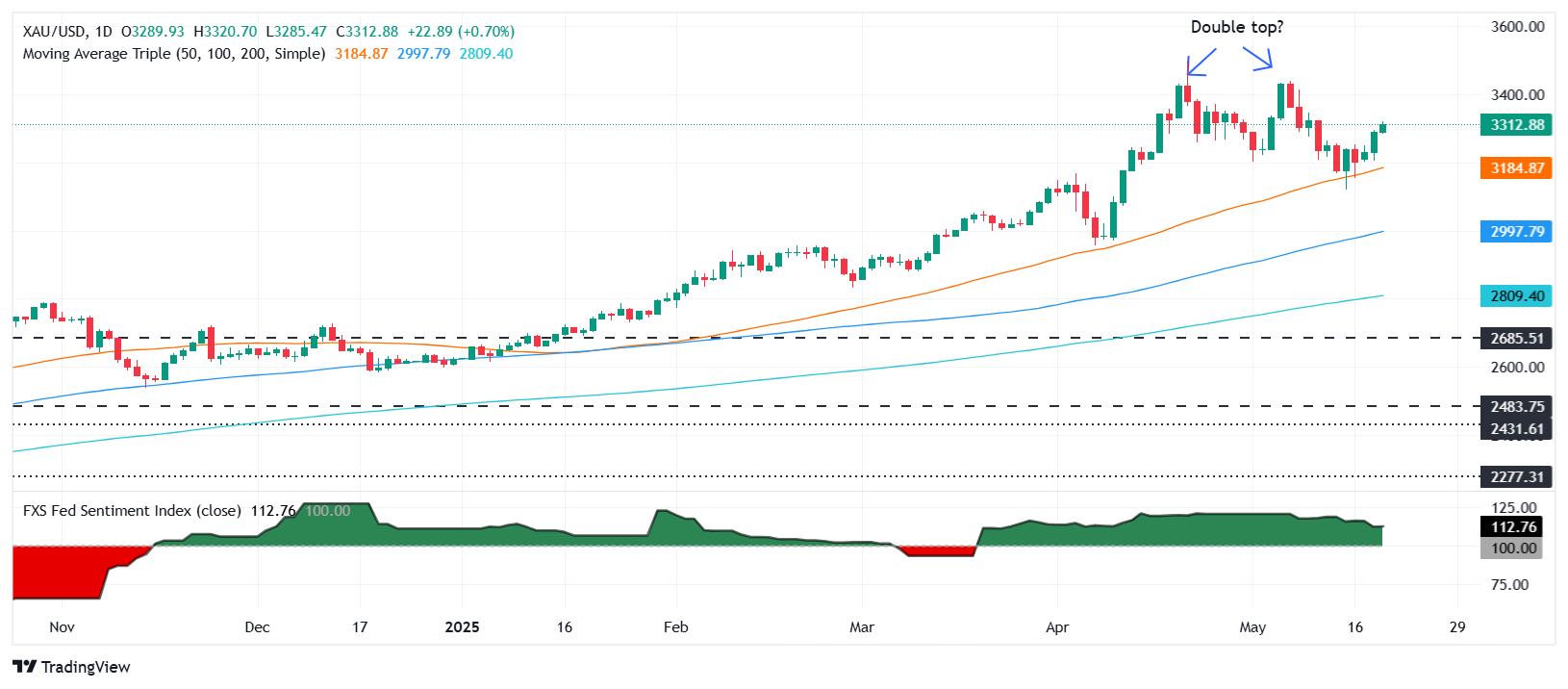Gold holds above $3,300 as geopolitical risks, US debt woes mount
- Gold rises as traders brace for vote on Trump’s debt-heavy tax bill.
- Moody’s downgrade and falling US Dollar fuel safe-haven demand for Gold.
- Middle East unrest offsets easing US-China trade tensions, keeping risk appetite muted.
Gold prices advance by over 0.50% and remain above the $3,300 mark as traders grow increasingly nervous about the United States (US) tax bill vote, along with escalating tensions in the Middle East. XAU/USD trades at $3,307 after bouncing off a daily low of $3,285.
The market mood remains downbeat as major US equity indices post losses while US Treasury bond yields rise. Market participants are awaiting the approval of President Trump’s tax-cut bill, which, according to the Congressional Budget Office (CBO), would add nearly $3.8 trillion to the US national debt.
The approval could underpin US stocks higher. However, the Greenback’s reaction is uncertain following Moody’s downgrade of US government debt last Friday, which triggered a USD sell-off, as depicted by the US Dollar Index (DXY).
The DXY, which tracks the performance of the American currency against six others, declines 0.52% to 99.49, a tailwind for bullion prices.
Heightened tensions in the Middle East boosted Gold prices, even though China-US tensions de-escalated as Beijing and Washington substantially reduced tariffs for 90 days to kick off negotiations to achieve a trade deal.
This week, traders will eye Fed speeches, Flash PMIs, housing data and Initial Jobless Claims.
Gold daily market movers: Gold rallies amid high US Treasury bond yields, weak US Dollar
- US Treasury bond yields are skyrocketing as the US 10-year Treasury note yield climbs nine and a half bps to 4.58%. Meanwhile, US real yields are also up nine and a half basis points at 2.229%.
- Bullion prices are rising due to concerns about the increase in US debt. Last week, Moody’s, the international rating agency, downgraded the US government rating from AAA to AA1, propelling Gold prices higher as the US Dollar got ditched and the US fiscal position worsened.
- On Tuesday, Federal Reserve (Fed) policymakers commented that monetary policy is appropriate, acknowledging that rising US import tariffs are inflation-prone and warrant holding rates.
- Gold price could extend its gains, boosted by geopolitical news. On Tuesday, CNN news, citing multiple sources, revealed that Israel is preparing to attack Iranian nuclear facilities.
- Data from the Chicago Board of Trade (CBOT) suggests that traders are pricing in 48.5 basis points of easing towards the end of the year.
XAU/USD technical outlook: Gold poised to test $3,350 as bulls gather steam
Gold price rally extended for the third straight day, as price action has printed successive days of higher highs and higher lows, with buyers eyeing key resistance levels. Momentum, as depicted by the Relative Strength Index (RSI), suggests that the uptrend will continue before the RSI gets to overbought territory, which could warrant a pause lying ahead.
Therefore, Gold's first resistance would be the $3,350 psychological level. Once surpassed, the next target would be $3,400, followed by the May 7 daily high of $3,438, before testing the all-time high (ATH) at $3,500.
For a bearish reversal, Gold bears must drag spot prices below $3,300. Once cleared, immediate support emerges at a May 20 daily low of $3,204, ahead of the 50-day Simple Moving Average (SMA) at $3,184.

Gold FAQs
Gold has played a key role in human’s history as it has been widely used as a store of value and medium of exchange. Currently, apart from its shine and usage for jewelry, the precious metal is widely seen as a safe-haven asset, meaning that it is considered a good investment during turbulent times. Gold is also widely seen as a hedge against inflation and against depreciating currencies as it doesn’t rely on any specific issuer or government.
Central banks are the biggest Gold holders. In their aim to support their currencies in turbulent times, central banks tend to diversify their reserves and buy Gold to improve the perceived strength of the economy and the currency. High Gold reserves can be a source of trust for a country’s solvency. Central banks added 1,136 tonnes of Gold worth around $70 billion to their reserves in 2022, according to data from the World Gold Council. This is the highest yearly purchase since records began. Central banks from emerging economies such as China, India and Turkey are quickly increasing their Gold reserves.
Gold has an inverse correlation with the US Dollar and US Treasuries, which are both major reserve and safe-haven assets. When the Dollar depreciates, Gold tends to rise, enabling investors and central banks to diversify their assets in turbulent times. Gold is also inversely correlated with risk assets. A rally in the stock market tends to weaken Gold price, while sell-offs in riskier markets tend to favor the precious metal.
The price can move due to a wide range of factors. Geopolitical instability or fears of a deep recession can quickly make Gold price escalate due to its safe-haven status. As a yield-less asset, Gold tends to rise with lower interest rates, while higher cost of money usually weighs down on the yellow metal. Still, most moves depend on how the US Dollar (USD) behaves as the asset is priced in dollars (XAU/USD). A strong Dollar tends to keep the price of Gold controlled, whereas a weaker Dollar is likely to push Gold prices up.
